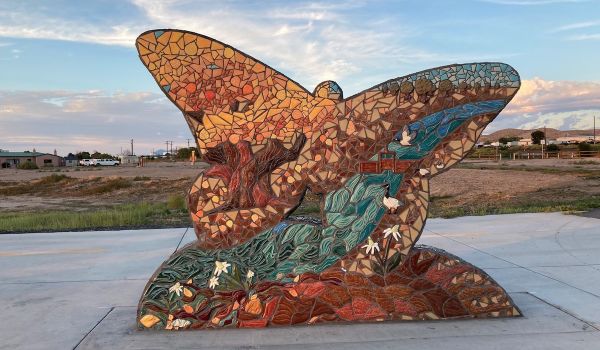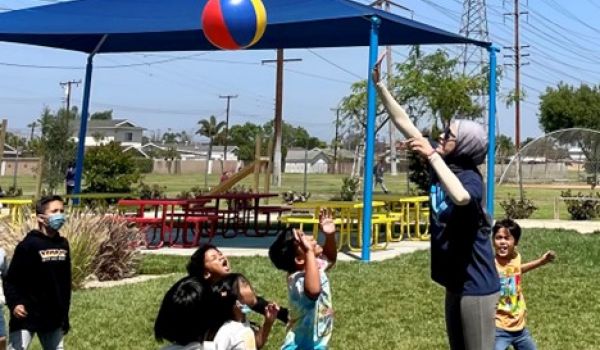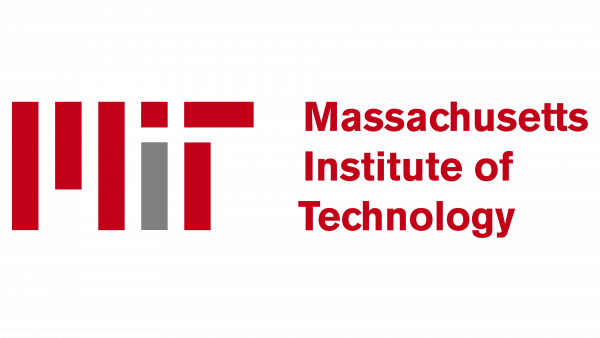New Earth’s mission of guiding at-risk young people in Los Angeles from the streets, from incarceration and from being drop-outs into bright new futures was born out of conversations between friends in a Hollywood coffee shop in the early 2000s.
Now, nearly two decades later, the nonprofit is continuing to help teenagers and young adults turn their lives around through its community center in Culver City, California, that offers vocational and high school educational programs and engages them with its flagship program: FLOW (Fluent Love of Words). Turning poetry into music and song, the FLOW program is embedded into the New Earth curriculum that serves Los Angeles schools, youth detention facilities and group homes.
“Music is the one thing that connects everything,” says Yana Simone Grammer, co-founder of New Earth Life and its executive vice president. The students, she says, “grew up in a hip-hop culture and traditional education does not offer that.” By infusing music into the learning structure, students have fun and gain the skills they need to improve their lives. According to New Earth, 81% of FLOW students improved their grade point averages as a result of the program.
Simone Grammer founded the organization with her husband, psychologist Dr. Harry Grammer, who says he relates to the young people he serves because he himself spent five years on juvenile probation. After founding New Earth with Simone Grammer, Dr. Grammer went on to be chosen as an Obama Foundation Fellow.
New Earth serves 800 students a year. Every student is assigned a case manager who develops a life plan and tracks whether the student needs to get a job or go to school to get more credits. Some may need to get off probation while others are seeking secure housing. They monitor how students handle pressure and stress and whether they need help when it comes to substance use, and offer financial workshops.
The students at New Earth have been failed by traditional education, Simone Grammer says. Her staff has found 18-year-olds with a third-grade reading level and others who cannot handle basic multiplication. About 97% of the students are people of color and for some, English is not their first language. New Earth provides academic support intertwined with music education, including includes an English supplement program based on California Common Core standards. The students generally range in age from 14 to 24, but at the Culver City center, some students are as young as 12.
“Our goal is to catch them up to go to college and get a job,” she says. “These are children who have really tough life situations.”
For the older participants, help getting jobs is a crucial part of the package. Through the FLOW program, students learn digital media and music production as well as front- and back-end software development. New Earth helps its graduates find jobs and employs 70% of its students in some capacity as a way to keep them on the road to a better life. College counseling is provided as well.
“College is not often easy,” Simone Grammer says. “They need to be paid right away or they will go back on the street.” New Earth’s recidivism rate is a very low 7%.
In 2019, New Earth had 39 graduates. But, last year, because of the COVID-19 pandemic, there were only seven graduates. “It was a really, really rough year,” Simone Grammer says. Even so, 82% of participants are either currently enrolled in high school or have graduated.
To help tide New Earth over during the pandemic, the Nonprofit Finance Fund, a New York-based CDFI, gave New Earth a much-needed $500,000 bridge loan. The loan will also allow New Earth to build a dedicated development team.

This story is part of our series, CDFI Futures, which explores the community development finance industry through the lenses of equity, public policy and inclusive community development. The series is generously supported by Partners for the Common Good. Sign up for PCG’s CapNexus newsletter at capnexus.org.
Frances McMorris is a Tampa-based writer who has been a staff reporter covering courts and legal affairs for the Wall Street Journal, the New York Daily News and Newsday. She specializes in legal and business topics.

_920_691_80.jpg)





_920_518_600_350_80_s_c1.jpg)








